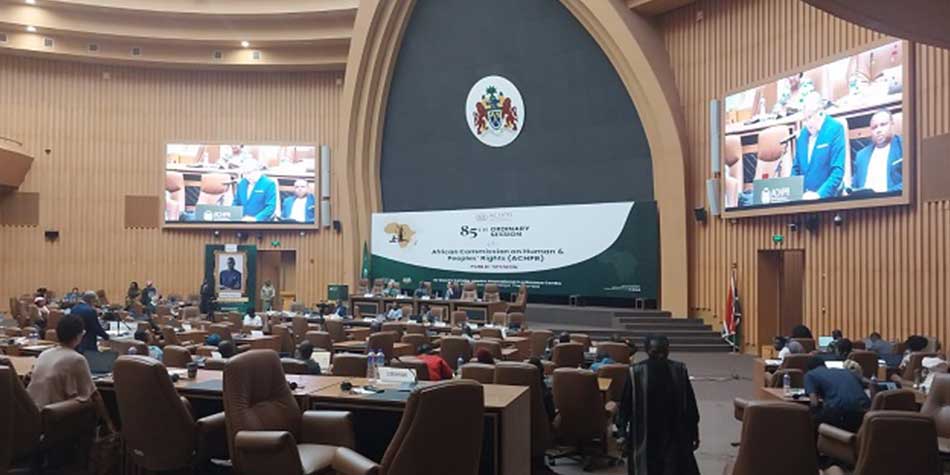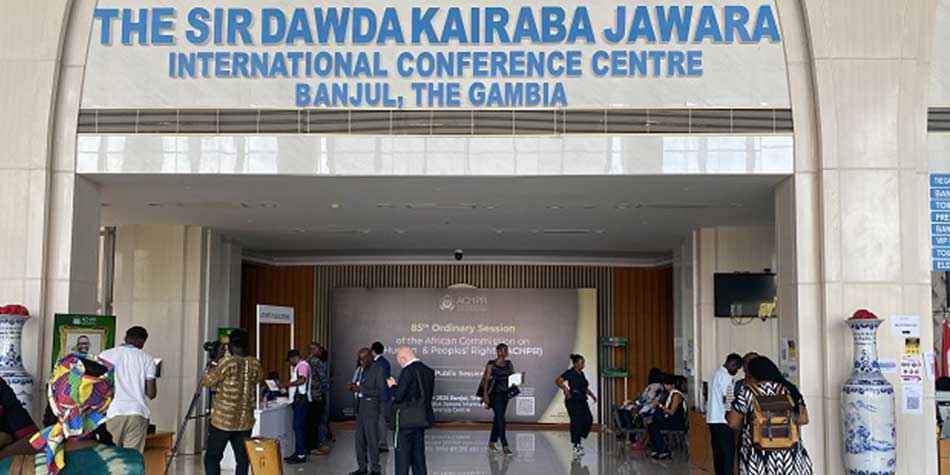
Abolition of the death penalty at the United Nations Human Rights Council 54th session
International standards
The United Nations Human Rights Council met for its 54th Regular Session from September 11 to October 13, 2023. If you missed it, here is what happened regarding the abolition of the death penalty!
During the debates
During the Global Update by the High Commissioner for Human Rights at the beginning of the session, Volker Türk noted the sharp increase in the use of the death penalty in Iran against protesters as against the Baloch and others from minority communities.
During the General Debate under Item 3, the Secretary-General’s yearly supplement to the quinquennial report on capital punishment and the implementation of the safeguards guaranteeing the protection of the rights of those facing the death penalty (A/HRC/54/33) was presented. It highlighted the progress made towards the abolition of the death penalty during this period, particularly in sub-Saharan Africa, but noted the increased number of executions. Spain made a statement on behalf of the European Union to “reaffirm its strong and unequivocal opposition to the use of the death penalty under all circumstance” and to call on all States who still retain the death penalty to establish a moratorium. Switzerland also made a statement on behalf of the core group on the human rights implications of drug policy, and “expressed concern on the imposition and application of the death penalty has resumed or increased significantly in a number of countries.” Watch it here.
The Human Rights Council adopted resolution (A/HRC/54/L.34) on the Question of the death penalty by a vote of 28 in favour, 11 against, and 7 abstentions. Prior to the adoption, five informal consultations were organized on the resolution on the question of the death penalty were organized between September 21st and October 3rd, and all were attended by the World Coalition and its members. The consultations also included several retentionist states aiming to influence the draft text of the resolution. In the final resolution, the Council called upon States that have not yet abolished the death penalty to take active steps to reduce the number of offences for which the death penalty can be imposed, to limit them strictly to threshold of “the most serious crimes.” The Council called for the end of the mandatory death penalty in countries that still use this practice. The Council also urged retentionist states to protect the rights of people facing the death penalty and other affected persons; called upon States that have not yet acceded to or ratified the Second Optional Protocol to the International Covenant on Civil and Political Rights, aiming at the abolition of the death penalty, to do so, and urged all states to respect and enforce international standards that provide safeguards for the human rights of people facing the death penalty.
The Council also requested that the Secretary-General dedicate the 2025 supplement to his quinquennial report on death penalty to the consequences arising at different stages of the imposition and application of the death penalty on the enjoyment of the human rights of persons facing the death penalty and other affected persons, and to present it to the Council for consideration at its 60th session.
The Council also decided that the upcoming biennial high-level panel discussion to be held during the 58th session of the Human Rights Council would cover the contribution of the judiciary to the advancement of human rights and the question of the death penalty.
During the Interactive Dialogue on the Oral Update of the High Commissioner on the Situation of Human Rights in Belarus, speakers called for “a moratorium on all executions with a view to abolishing the death penalty.” Watch it here.
During the Consideration of Universal Periodic Review Outcome of Barbados, the state was congratulated on the ratification of several human rights instruments, and was urged to take necessary steps necessary to abolish the death penalty. Watch it here.
CIVIL SOCIETY ORAL STATEMENTS ON THE DEATH PENALTY
On the occasion of this 54th session, several members of the World Coalition against the Death Penalty presented oral statements on the death penalty.
The Advocates for Human Rights and the World Coalition co-delivered an oral statement during the adoption of the Universal Periodic Review Outcome of the United Arab Emirates, expressing concerns with regards to the increased use of the death penalty, the resuming of executions since 2021 as well as the increased number of death sentences handed out. The also condemned the use of the death penalty for crimes that do not meet the threshold of most serious crimes, including drug offenses, adultery and “sodomy of a man” falling under the category of morality crimes, as well as its discriminated use against migrant workers, in particular women. The regretted that the UAE noted all 21 recommendations received that related to the death penalty. Watch the intervention here.
During the adoption of Universal Periodic Review Outcome of Mali, The Advocates for Human Rights and the World Coalition commended Mali for maintaining its de facto moratorium on executions since 1958, and for the continued support for the biennial UNGA resolution calling for a moratorium on executions. They regretted the continued imposition of death sentences by Malian courts. They welcomed the commitment to further support the National Human Rights Commission, and to facilitate independent access to detention centres and assess the treatment of persons on death rows. They expressed their concern regarding the fact that Mali noted all 25 recommendations to ratify the Second Optional Protocol to the ICCPR and to abolish the death penalty. They called for the government to adopt a de jure moratorium on the use f the death penalty and the commuting of all death sentences.Watch the intervention here.
During the adoption of Universal Periodic Review Outcome of Barbados, The Advocates for Human Rights, Greater Caribbean for Life and the World Coalition delivered a joint statement and commended the legislature of Barbados for removing the mandatory death penalty as a punishment in 2019. They noted that although Barbados has amended the Offenses against a Person Act to establish guidelines for sentencing in case of a previous mandatory death sentence, it is unclear how officials are implementing these amendments. They welcomed the continued de facto moratorium on executions since 1994. They however urged Barbados to take the full steps necessary to abolish the death penalty, commute all death sentences, and in the meantime adopt a de jure moratorium on executions and cease issuing death sentences. They noted that Barbados received 21 recommendations on the death penalty, to abolish and to ratify the Second Optional Protocol to the ICCPR. They called on the OHCHR and UN members states to offer technical support for death penalty abolition. Watch the statement here.
The Advocates for Human Rights, the World Coalition and Ditshwanelo delivered a statement during the adoption of Universal Periodic Review Outcome of Botswana and commended the government for partly supporting a recommendation to consider a regulatory framework to investigate torture allegations, but expressed concern that it did not fully support the recommendation which also called for the abolition of the death penalty. The also regretted that Botswana noted all 30 recommendations received on the death penalty, including one by the United Kingdom calling to impose an immediate moratorium on the death penalty while working on further reforms of its justice system and gather public opinion on its relevance. Given Botswana’s reliance on public support as a justification for the death penalty, they called on Botswana to educate its population on the lack of efficiency of the death penalty in deterring crime and international standards relating to capital punishment. Watch it here.
During the adoption of Universal Periodic Review Outcome of the Bahamas, The Advocates for Human Rights, Greater Caribbean for Life and the World Coalition commended the Bahamas for maintaining a 2-decade long de facto moratorium on executions and welcomed the ratification of the Convention against Torture in 2018. They further welcome the acceptance of 6 recommendations to improve life conditions in prisons and prison overcrowding. They noted with concern that the death penalty remains legal in the Bahamas and that the government asserted with no explanation during the interactive dialogue that it could not ratify the Second Optional Protocol to the ICCPR. The regretted that the Bahamas noted recommendations on abolishing the death penalty and on adopting a de jure moratorium on executions. They noted with concern that Bahamas noted Belgium’s recommendation calling to reduce the offenses for which the death penalty can be imposed, including offenses that do not meet the threshold of the most serious crimes. They called on the government for concrete steps towards abolition of the death penalty and on the OHCHR and UN members states to offer technical support. Watch it here.
Harm Reduction International made a statement on the OHCHR’s report on Human Rights Challenges in addressing and countering all aspects of the world drug problem, and the Secretary-General’s report on the question of the death penalty, reiterating that drug offences do not meet the definition of ‘most serious crime’ despite 35 states retaining the death penalty for drug offenses. They insisted on the need to divest from punitive drug control responses and invest in human rights-based policies instead.
RESOLUTIONS ADOPTED
The Human Rights Council adopted 36 resolutions, including one on the question of the death penalty, 14 decisions and one President’s statement.
SIDE EVENTS
One side event was organized by members of the World Coalition Against the Death Penalty.
A side event was organized on October 3 by Americans for Democracy and Human Rights in Bahrain about the situation of human rights in Bahrain.
The 55th regular session of the Human Rights Council is scheduled to take place in Geneva from February 26 to April 5, 2024.
Categories
Trend Towards Abolition






